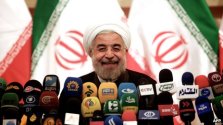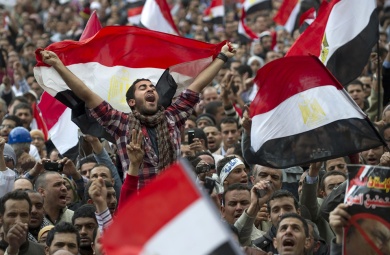 In 15 June ’13, Hassan Rouhani a clerics and Doctor from Glasgow Caledonian University won the election with 50,7% voters on his hand, it is clear that he no need to take another run for second election. And until now there is no significant protest on the result, Interior Minister Mostafa Mohammad Najjar said that others candidate that unsatisfied with the election outcome may complaint within three days, its almost one month.
In 15 June ’13, Hassan Rouhani a clerics and Doctor from Glasgow Caledonian University won the election with 50,7% voters on his hand, it is clear that he no need to take another run for second election. And until now there is no significant protest on the result, Interior Minister Mostafa Mohammad Najjar said that others candidate that unsatisfied with the election outcome may complaint within three days, its almost one month.
Rouhani is depicted as moderate cleric with low-profile attitude, he is the only Islamic clerics among other eight candidates, it turned six at when one candidate withdraw and tow other dismissed by the government, giving a favor for Rouhani. Rouhani also well supported by two ex-presidents Mr Khatami a reformist and Akbar Hashemi Rafsanjani that his candidacy proposal overturned by The Islamic Republic. Rouhani, previously served as the Iran chief nuclear negotiator under the former president Mohammad Khatami. Under his hand, Iran agreed to halt uranium enrichment and shown co-operative manner toward the inspectors of the International Atomic Energy Organization, moreover Rouhani is develop a mutual relations with western countries.
Rouhani has joined the 2009 Green Movement that protested on Ahmadinejad second term, and believed that the incumbent loyalist has fixed the election. The movement has brought one of prominent reformist figure Mir Hossein Mousavi on house arrest.
As a reformist Rouhani views on Ahmadinejad is clear: careless and miscalculate his policy on Iran internal situation, in particular playing antagonize policy toward western countries. Rouhani believe that Ahmadinejad political attitude has brought problem to Iran internal issue.
The question is, how far Rouhani can go to fix that problem? Or how reformist is he is? First of all it is quite important to define what is the term of reformist refer to in country such as Iran that has survived the 20th century with two revolutions, two world wars, two international sanctions, and vicious war against Iraq.
When February revolutions occurred in 1979, the Islamic group that led by Ayatollah Khomeine is not the only faction that promotes the revolution. From 1960 to 1970 the power in Iran has been in the hand of Reza Shah and his corrupt allied. Iran oil reserve has strengthened the Shah bargain position with opposition, and also foreign powers in particular USA and British.
There was a high growth rate of economy throughout the period, although differences in income and welfare between city and rural area is widening, and within the urban life itself. For the sake of stability, Shah eliminated freedom and critical political participation.
All factions in Iran reacted against the Shah, one of it is the Communist Tudeh Party that unfortunately cannot emerged from Soviet-Stalinist political style, that put Tudeh miss calculated the social-economy and cultural situation in Iran, make their political moves looks stiff and inefficient. Some other factions reacted against the shah are the landlord, intellectuals, professionals and moderate clerics. The famous Islamist faction led by Khomeine, that in June 1963 launched a revolt against Shah; the revolt was suppressed and Khomeine was later exiled to Turkey and eventually Iraq.
The Shah using Savak an intelligence unit that kidnap and torturing the oppositions. It is strong noticed by the Iranian that Reza Shah is back up by the USA. This lead to very negative sense against both the Shah and USA among all level of society in Iran.
Many Iranian foreign allies including the US start to criticize the Shah violent method in handle the opposition that run by Savak. In early 1977, Jimmy Carter became President of the United States, and he put human rights into his foreign policy agenda. The Carter administration suggested that if Iran did not improve its human rights record, aid, including military assistance, might be terminated. The Shah acted on Carter’s wishes, and some would view Carter’s pressure as instrumental in Shah’s fall. The Shah’s regime released 357 political prisoners in February 1977. The freedom of expression starts to occur. Mass protest start flooding the streets in Tehran and many other cities in Iran. The Iranian demand more inclusive economy, freedom of speech and fair political system.
In Qom a religious city 156 kilometers from Tehran, the massive demonstration start a little bit late. In October 1977, Musthapa, Khomeine son died in his bed, probably because of heart attack. But the rumor said it was Savak who did it. That rumor provokes demonstration in Qom, the demand is similar with most of other Iranian.
In the following years, the Shah seems cannot hold the power anymore. January 16, 1979, the Shah and his family fled to Egypt, and then to US. Iranian revolution is engineered by many factions, leftist, liberal and Islamist. However after the revolution, the Islamist get most of role dictating the revolution, its because the Islamic Ulama and scholars in Iran is relatively more consolidated from other faction, they are a certain social class and can coordinate their political view clearly. On the other hand, the Tudeh party is considered failed to consolidate the labor, urban poor and the leftist intellectuals in Iran, which actually plays a significant role in massive demonstration that suppressed the Shah. Except the Islamist, other factions in Iran are divided into small groups, and relatively less powerful compare with the Islamist.
Soon after gaining power in post revolution, Khomeine announced a decree to form an Iranian Revolutionary Guard (Pasdaran) in 5 May 1979, is to replaced all military official that previously served the Shah, however the role of Revolutionary Guards soon change, they often suppressed any internal disturbance and critical voice that follows the revolution, just like Savak in Shah era and Gestapo in Soviet Union. Pasdaran also plays important role in Iraq-Iran war, 1980-89.
The new Islamic state constitution has give power to Mullah (Islamic Leader) that resides in Qom. The Islamic State is not at a stage of capability to handle disputes with liberal, socialist and other critical expression toward the new regime. Soon after the revolution, the regime caught activist, journalist and intellectuals that have criticized the regime. Women social activity has been restricted, political activity are only applicable for those who in favor to the regime. Once again Iranian is screaming for freedom. In 1997, the first reformist in post revolution appeared as winner in presidential election, Muhammad Khatami. There was more freedom of expression, greater observance of legal process, less pressure on women, and improvement in international policy. However in Khatami era the anti-reformist has consolidated their mission, with backup from Revolutionary Guards, they supporting Ahmadinejad candidacy in 2005, that in sudden change all reformist policy from Khatami, especially in international policy.
Khatami leadership in Iran is the first era that defined what is reformist in term of Islamic Republic of Iran, which is openness; accommodate more political interest, freedom of public media, access to public spare and political transparency. Many anti-reformists believe that kind of policy is gate for western ideology entering the country. Meanwhile the reformist believe that, it’s the only way to tackle corruption, inequality in economic and develop fairness in politic. In 2009 when Ahmaddinejad won his second term, mass demonstration known as green movement criticized the election, it soon crashes by Revolutionary Guards, and Qom also condemns the movement. Rouhani was strong supporter of green movement.
The successful of Rouhani in Iran presidential election is a sign that the similar reformist ethic that was implemented by Khatami will be re-activated. Many Iranian felt that Ahmadinejad administrative has abused their social and political rights. However the question is escalating to the western interest on Iran, the western is demanding Iran dismantling their nuclear program, and reducing support for Hamas and Hezbollah. One of the most critical conservative voices toward Rouhani is indeed Bennyamin Netanyahu. “The international community should not fall into wishful thinking and be tempted to ease pressure on Iran to stop its nuclear programme,” said Netanyahu, adding: “Iran will be judged on its actions. If it insists on continuing to develop its nuclear programme the answer needs to be clear – stopping its nuclear programme by any means.” Netanyahu also referring on Iran support to Hamas and Hezbollah.
Hezbollah, Hamas, and Iranian nuclear program (which Iran doesn’t have a nuclear weapon yet, and Israel does) are part of regional security respond. Iran as well as many middle-east countries are under huge pressure on the Palestine situation, and also threat from Israel as the most powerful military in Middle East and owned nuclear weapon. To negotiate on the Iran nuclear program should mutually engaging all of regional security issues, it also including Israel political attitude toward Arab countries. Western country should lower down a bit their expectation on this matter.
Rouhani reform agenda will focus on fixing Iranian internal dispute with anti-reformist, and some conservative clerics in Qom that seems will oppose Rouhani reform plan. On the other hand, Rouhani will pitch long run of negotiation with western countries, Israel and their Gulf neighbors. And the most important is the Syria issues that start to amplified especially when US officially supply the rebels with weapons.
It is absolutely a hard job for Rouhani, he will face domestic conservative opponent as well as foreign. It is quite obvious that Rouhani with his reform spirit will propose a more moderate Iran to the world, however it is unclear are the western countries in particular Israel and US are ready for the new Iranian reformist.
